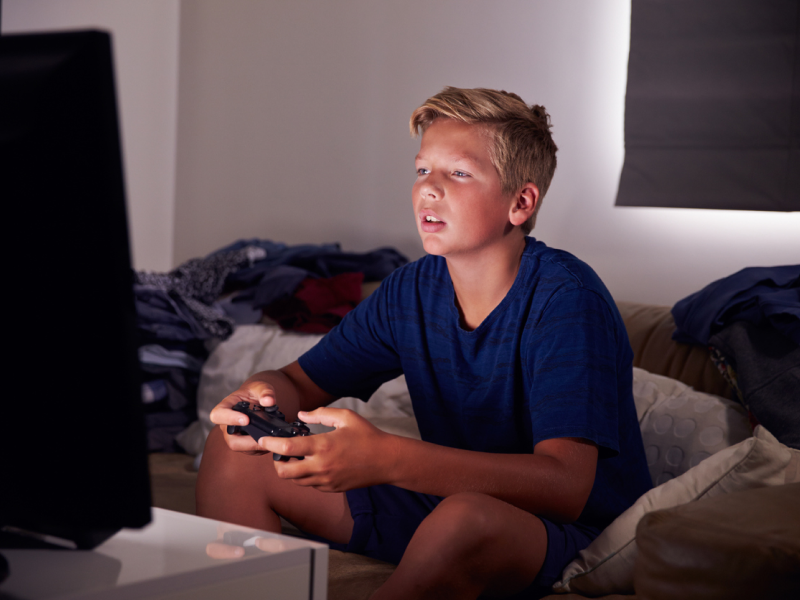
Table of Contents
Video Games and Mental Health: The Good and the Bad

Written By: Ashley Laderer

Clinically Reviewed By: Dr. Don Gasparini
July 5, 2023
8 min.
Video games have the power to impact mental health in both positive and negative ways. Read on to learn more.
Learn more about our Clinical Review Process
Table of Contents
Whether they’re exploring mythical lands in World of Warcraft, battling friends in Fortnite, or building towns in Animal Crossing, there’s no denying that tons of people love playing video games. In fact, one survey found that 85% of middle and high school students played video games in the last year.
Although video games allow young people to explore fantasy worlds, get creative, and challenge their friends online, gaming’s pervasive impact on our culture may not be solely beneficial. According to one report, a whopping 86% of parents think their kids spend too much time gaming, citing concerns about their children’s sleep, social interactions, and mood. These parental worries often lead to questions like, ‘Is my teenager addicted to video games?’ Gaming has become a huge part of our culture, but what does that mean for mental health?
Just like any other form of entertainment, video games have the power to impact mental health. So many factors play into the effect that gaming has on someone’s mental health. For example, do they have a healthy social life? Do they struggle with any mental health conditions? What kind of game are they playing? How many hours a week or day are they playing? Let’s dive into both the potential negative and positive effects of video games.

Help is here for gaming-related struggles
Explore virtual therapy for teens and adults today.
The negative effects of video games on mental health
In recent years, video games have been under scrutiny for potentially worsening gamers’ mental health, and video game “addiction” has become a big concern. Research shows that excessive gaming can lead to negative mental health consequences.
Here are five adverse mental health outcomes that can be caused by video games:
1. Increased aggression
Many popular video games are violent in nature, requiring players to attack or kill other characters. While the research is mixed, some studies have suggested that violent video games can lead to increased aggression or aggressive behaviors. However, various external factors play a role in this, too.
2. Disrupted sleep
Gaming, especially excessive gaming, poses a threat to sleep quality. A lot of people engage in long late-night gaming sessions, which can disrupt their sleep patterns, leading to less quality sleep. Getting good sleep is crucial for mental health, and if video games cause someone to experience sleep deprivation, this can negatively impact mental health and cause existing mental health conditions to worsen.
3. Unhealthy escapism
Video games can serve as a fun escape from the pressures and challenges of everyday life. However, this can easily veer into unhealthy territory when young people spend too much time gaming. They may use video games to avoid facing their real-life challenges or emotions. Young people may develop an unhealthy dependence on this escapism, causing them to rely on video games more and more.
4. Depression
Problematic gaming behavior, such as gaming excessively, is linked to depression, which is one of the common depressive disorders affecting teens. If a young person is alone gaming for hours on end, ignoring their real-life friendships and connections, this can lead to isolation which is a risk factor for depression. Additionally, excessive escapism through video games is related to depression.
Furthermore, researchers have found some evidence between depression and violent video games. According to one study, young people who played more than two hours of violent games every day had more depression symptoms than those who played non-violent games.
5. Social anxiety
Social anxiety and excessive gaming sometimes go hand in hand. It goes both ways: young people with social anxiety may be more likely to play video games in a problematic way, and young people who game too much may experience increased social anxiety. If young people spend more time gaming than engaging in face-to-face interactions, this can fuel social anxiety and cause them to feel more comfortable playing video games rather than socializing in person.
The more a young person engages in excessive gaming, the higher the risk of experiencing these negative effects. These impacts are more likely to affect people playing video games for multiple hours every day than casual gamers.
What is internet gaming disorder (IGD)?
When discussing the negative effects of video games, it’s important to also discuss the risk of developing internet gaming disorder (IGD).
IGD is sometimes used interchangeably with the term “video game addiction.” For some gamers, gaming can become problematic and negatively impact their lives. They develop a behavioral addiction to playing video games, and this gets in the way of their functioning—at this point, someone might be diagnosed with IGD.
Some symptoms of IGD include:
- Experiencing withdrawal symptoms (irritability, anxiety, or sadness) when not gaming
- Consistently using video games as escapism
- Lying to loved ones about how much time spent gaming
- Prioritizing gaming over relationships or other activities
- Needing to spend more and more time gaming to feel the same pleasure
- Performing poorly at school or work due to excessive gaming
- Reducing time spent on personal hygiene and grooming
- Trying to relieve emotions like hopelessness or guilt by gaming
- Having trouble reducing gameplay or quitting games despite all of this
For a professional to diagnose someone with IGD they must exhibit multiple symptoms for over a year. In these cases, it’s crucial for the individual to seek mental health treatment.
The link between neurodivergence and IGD
Since some neurodivergent people experience heightened sensory processing, intense focus on specific interests, and a preference for structured routines, certain aspects of gaming may be extra appealing to them. Put simply, the immersive and predictable nature of video games can be particularly appealing to neurodivergent people.
Some research has pointed to connections between neurodivergence and problematic video game usage. For example, some studies have shown that people with an autism spectrum disorder might be more likely to engage in excessive gaming –– potentially leading to an increased risk of IGD. Links have also been found between attention-deficit/hyperactivity disorder (ADHD) and increased risk of IGD.
However, this does not mean neurodivergent people are guaranteed to play video games in a problematic manner. Many neurodivergent people healthily play video games and experience the benefits of online social connection and stress reduction. On the flip side, some neurotypical people play video games problematically. In short, neurodivergence isn’t the cause of problematic video game usage, but it can leave someone more disposed to excessive gaming.
The positive effects of video games on mental health
While concerns about the negative effects of video games on mental health are certainly valid, it’s important to recognize the potential positive impacts they can have. Some of the benefits might surprise you. Here are four potential benefits that playing video games can have on cognitive and mental health:
1. Improved problem-solving skills and creativity
Some video games can serve as a mini mental workout, stimulating the brain to work hard and find creative solutions. Many games involve critical thinking, strategizing, and solving complex, unique problems. Research has suggested that playing games that require creative problem-solving can improve individuals’ problem-solving skills and boost creativity.
2. Social connection
Although many adults view gaming as an isolating activity, many of today’s video games actually encourage social interaction. Even though people may not be socializing with someone physically in the same room, they can chat with other players and work together as they play.
Online multiplayer video games enable people to connect with friends in real life or new friends from the game. Gaming can reduce loneliness in some cases. However, it’s crucial for gamers to also have face-to-face social interactions outside of gaming.
3. Stress and anxiety relief
Many teens and young adults in Gen Z struggle with their mental health, experiencing higher rates of mental health concerns like anxiety. Understanding how to identify stress in young teens can be crucial for providing support. Video games, in moderation, can be a helpful stress reduction tool. Research has found that many types of games can help relieve anxiety.
Individuals can immerse themselves in gameplay, staying focused and present in the moment as they shift their attention away from their racing anxious thoughts. This can help them find a much-needed sense of calm. Due to their nature, “cozy games” that are cute, relaxing, and low-stakes may be especially helpful for stress relief, but researchers have found many different types of games to help people reduce anxiety.
4. Reduction of depression symptoms
Many Gen Z members struggle with depression, too, and playing video games in moderation can serve as a mood booster for depressed people. Simply put, video games are fun –– and it’s important for everyone’s well-being to have fun, which is a core component of self-care for teens. Some people with depression struggle to feel joy or pleasure, and playing video games may help bring these feelings back, at least temporarily. Also, people dealing with depression might also feel isolated, and the social interaction from multiplayer online games may help provide some relief.

Taking a balanced approach to gaming
As you can see, there’s research to support the argument that gaming negatively impacts mental health and the argument that it positively impacts mental health. So, if you or your loved one is a gamer, try to play video games in moderation so that you can reap the benefits while preventing some of the adverse effects. Some ways to do this are:
- Limit the number of hours spent playing video games
- Participate in other activities, such as sports or mental health-boosting hobbies for high school students that don’t involve technology
- Foster in-person social interactions with friends and family
- Notice when too much time is spent gaming or if behavior becomes problematic
- Reach out for help if you notice signs of IGD. If you’re a parent concerned about your child, learning how to talk to your teen about mental health challenges can be a helpful first step before seeking professional help for IGD
How Charlie Health can help
If you or a loved one are experiencing IGD or struggling with negative effects from video gaming, Charlie Health is here to help. Charlie Health’s virtual Intensive Outpatient Program (IOP) provides mental health treatment for people dealing with serious mental health conditions, including both the emotional and physical symptoms of grief. Our expert clinicians incorporate evidence-based therapies into individual counseling, family therapy, and group sessions. With support, managing your mental health and healing from grief is possible. Fill out the form below or give us a call to start healing today.
References
https://www.sciencedirect.com/science/article/abs/pii/S0747563217305939
https://www.frontiersin.org/articles/10.3389/fpsyg.2019.00384/full#
https://www.ncbi.nlm.nih.gov/pmc/articles/PMC6790614/
https://www.ncbi.nlm.nih.gov/pmc/articles/PMC6361300/
https://www.sciencedirect.com/science/article/pii/S2451958821000294#
https://journals.sagepub.com/doi/full/10.1177/1359105317740414
https://www.ncbi.nlm.nih.gov/pmc/articles/PMC4227415/
https://link.springer.com/article/10.1007/s40429-021-00406-3
https://my.clevelandclinic.org/health/diseases/23124-video-game-addiction
https://www.sciencedirect.com/science/article/abs/pii/S1750946721000015
https://pubmed.ncbi.nlm.nih.gov/29874473/
https://www.apa.org/monitor/2014/02/video-game
https://www.ncbi.nlm.nih.gov/pmc/articles/PMC8277305/
https://www.apa.org/pubs/journals/releases/amp-a0034857.pdf




